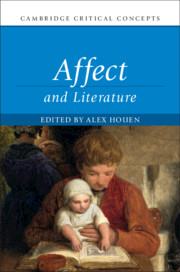Book contents
- Affect and Literature
- Cambridge Critical Concepts
- Affect and Literature
- Copyright page
- Contents
- Notes on Contributors
- Introduction
- I Origins
- Chapter 1 Poetic Fear-Related Affects and Society in Greco-Roman Antiquity
- Chapter 2 Secondary Affect in Lessing, Mendelssohn, and Nicolai
- Chapter 3 Affect and Life in Spinoza, Nietzsche, and Bergson
- Chapter 4 Feelings under the Microscope: New Critical Affect
- Chapter 5 ‘We Manufacture Fun’: Capital and the Production of Affect
- Chapter 6 Jacques Lacan’s Evanescent Affects
- Chapter 7 The Durability of Affect and the Ageing of Gay Male Queer Theory
- Chapter 8 Affect, Meaning, Becoming, and Power: Massumi, Spinoza, Deleuze, and Neuroscience
- Chapter 9 Translating Postcolonial Affect
- Chapter 10 Making Sorrow Sweet: Emotion and Empathy in the Experience of Fiction
- II Developments
- III Applications
- Index
Chapter 9 - Translating Postcolonial Affect
from I - Origins
Published online by Cambridge University Press: 16 January 2020
- Affect and Literature
- Cambridge Critical Concepts
- Affect and Literature
- Copyright page
- Contents
- Notes on Contributors
- Introduction
- I Origins
- Chapter 1 Poetic Fear-Related Affects and Society in Greco-Roman Antiquity
- Chapter 2 Secondary Affect in Lessing, Mendelssohn, and Nicolai
- Chapter 3 Affect and Life in Spinoza, Nietzsche, and Bergson
- Chapter 4 Feelings under the Microscope: New Critical Affect
- Chapter 5 ‘We Manufacture Fun’: Capital and the Production of Affect
- Chapter 6 Jacques Lacan’s Evanescent Affects
- Chapter 7 The Durability of Affect and the Ageing of Gay Male Queer Theory
- Chapter 8 Affect, Meaning, Becoming, and Power: Massumi, Spinoza, Deleuze, and Neuroscience
- Chapter 9 Translating Postcolonial Affect
- Chapter 10 Making Sorrow Sweet: Emotion and Empathy in the Experience of Fiction
- II Developments
- III Applications
- Index
Summary
Affect Studies are arguably still dominated by Eurocentric assumptions and categories. There is a tendency to universalize the emotions rather than pay attention to translating across differing cultural contexts and languages. To what degree do we need to take into account other taxonomies of affect informed by other languages and cultures as providing alternative grammars of the emotions (linked, for example to aesthetics) that are quite separate from the prevailing European concepts dominated by psychology and psychoanalysis? Like the ‘psy’ disciplines from which they derive, Affect Studies are too often dependent on universalist and ahistorical conceptual categories. The chapter examines Han Kang’s The Vegetarian (recent Man-Booker winner) to ask questions concerning the translatability of affect. Is it useful, for example, to invoke the Korean concept of ‘han’ as an interpretive lens for considering Kang’s text or does this land us inevitably in cultural essentialism? As we open up our concepts to the world, translation will be an unavoidable foundational element.
Keywords
- Type
- Chapter
- Information
- Affect and Literature , pp. 175 - 189Publisher: Cambridge University PressPrint publication year: 2020
- 2
- Cited by

